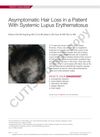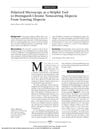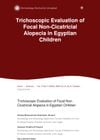26 citations,
December 2019 in “Indian Journal of Dermatology, Venereology and Leprology” PRP combined with minoxidil is the most effective and safe treatment for male pattern baldness.
 85 citations,
October 2012 in “Dermatologic Clinics”
85 citations,
October 2012 in “Dermatologic Clinics” Alopecia Areata is an autoimmune condition often starting before age 20, with varied treatment success and a need for personalized treatment plans.
 2 citations,
January 2023 in “Prague Medical Report”
2 citations,
January 2023 in “Prague Medical Report” JAK inhibitors, like baricitinib, are effective and safe for treating alopecia areata.
 July 2024 in “Journal of Cosmetic Dermatology”
July 2024 in “Journal of Cosmetic Dermatology” Rose stem cell exosomes can significantly improve hair growth in androgenetic alopecia.
 1 citations,
January 2014 in “Indian Journal of Dermatology, Venereology and Leprology”
1 citations,
January 2014 in “Indian Journal of Dermatology, Venereology and Leprology” The 'Swiss cheese' pattern in scalp biopsies can indicate trichotillomania, not just alopecia areata.
 8 citations,
January 2008 in “PubMed”
8 citations,
January 2008 in “PubMed” Mesotherapy for the scalp can cause severe infections, fat tissue death, and permanent hair loss.

Fungal infections can cause hair loss in lupus patients and should be considered even if rare.
 April 2023 in “Dermatology practical & conceptual”
April 2023 in “Dermatology practical & conceptual” Tacrolimus solution is effective and well-tolerated for treating inflammatory scalp conditions.
 May 2024 in “Indian Journal of Dermatology”
May 2024 in “Indian Journal of Dermatology” The woman has a rare skin condition called follicular Dowling-Degos disease, which has limited treatment options.
5 citations,
November 2013 in “Case reports in dermatology” A woman's skin darkened after using dutasteride and pimecrolimus for hair loss, but improved when she stopped the medications and protected her skin from light.
 December 2024 in “European Journal of Dermatology”
December 2024 in “European Journal of Dermatology” Oral minoxidil boosts hair and nail growth speed.

Benign skin tumors need accurate diagnosis to ensure proper treatment.
 September 2023 in “Irish Journal of Medical Science (1971 -)”
September 2023 in “Irish Journal of Medical Science (1971 -)” About 61% of women who had COVID-19 experienced hair loss afterward.
 1 citations,
April 2022 in “JAAD case reports”
1 citations,
April 2022 in “JAAD case reports” A woman with IgG/IgA pemphigus was treated successfully with dapsone and steroids.
6 citations,
January 2019 in “Indian Journal of Dermatology” November 2021 in “Clinical, cosmetic and investigational dermatology” An elderly woman with cancer improved after treatment for a rare skin condition with coiled hairs.
 8 citations,
August 2015 in “Journal of dermatological science”
8 citations,
August 2015 in “Journal of dermatological science” Rhododendrol in skin-whitening products can cause skin depigmentation and immune reactions.
March 2022 in “Journal of Investigative Dermatology” Discoid Lupus Erythematosus causes scalp plaques that can lead to hair loss, and antimalarial drugs are effective treatments.
 34 citations,
May 2017 in “Lasers in Surgery and Medicine”
34 citations,
May 2017 in “Lasers in Surgery and Medicine” Combining low-level light therapy and minoxidil 5% is more effective for female hair loss than using either treatment alone.
2 citations,
January 2017 in “International Journal of Trichology” Trichoscopy can reveal specific hair and scalp changes in linear morphea.
 11 citations,
January 2012 in “Archives of Dermatology”
11 citations,
January 2012 in “Archives of Dermatology” Polarized microscopy is a quick and free method to correctly identify types of hair loss.
 4 citations,
January 2013 in “European Journal of Dermatology”
4 citations,
January 2013 in “European Journal of Dermatology” Epigenetic differences affect hair loss in identical Japanese male twins.
 22 citations,
January 2013 in “International Journal of Trichology”
22 citations,
January 2013 in “International Journal of Trichology” Hair loss is often linked to thyroid problems, especially in women and older people, and screening for thyroid issues is advised for those with hair loss.
 14 citations,
September 2020 in “Dermatologic Therapy”
14 citations,
September 2020 in “Dermatologic Therapy” Oral minoxidil improves hair density in women with androgenetic alopecia, with mild side effects.
 October 2024 in “Dermatology Practical & Conceptual”
October 2024 in “Dermatology Practical & Conceptual” Using dermoscopy improves diagnosis of scalp and hair disorders in children.
January 2023 in “Indian Dermatology Online Journal” A 23-year-old man has a benign, non-progressive hair loss patch that doesn't respond to treatment but can be cosmetically treated.
 February 2022 in “Chinese Journal of Dermatology”
February 2022 in “Chinese Journal of Dermatology” A 36-year-old woman with worsening hair loss over 10 years was treated with various medications, and after six months, her hair loss did not worsen significantly.
 18 citations,
July 2018 in “Skin appendage disorders”
18 citations,
July 2018 in “Skin appendage disorders” Trichoscopy helps diagnose hair and scalp disorders in dark-skinned people by identifying unique patterns.
 July 2022 in “Berkala Ilmu Kesehatan Kulit dan Kelamin/Berkala ilmu kesehatan kulit dan kelamin (Periodical of dermatology and venerology)”
July 2022 in “Berkala Ilmu Kesehatan Kulit dan Kelamin/Berkala ilmu kesehatan kulit dan kelamin (Periodical of dermatology and venerology)” Most tinea capitis patients were young boys with cat contact, had scaly patches caused by Microsporum canis, and improved with griseofulvin treatment.
22 citations,
January 2017 in “Acta Endocrinologica” A woman with multiple autoimmune diseases showed improvement in hair loss but not in skin discoloration after treatment.





















